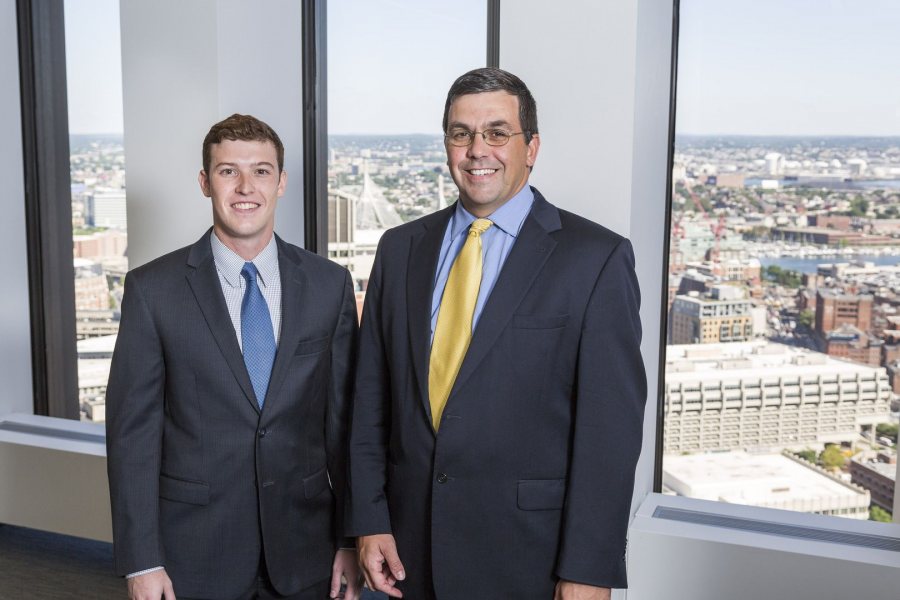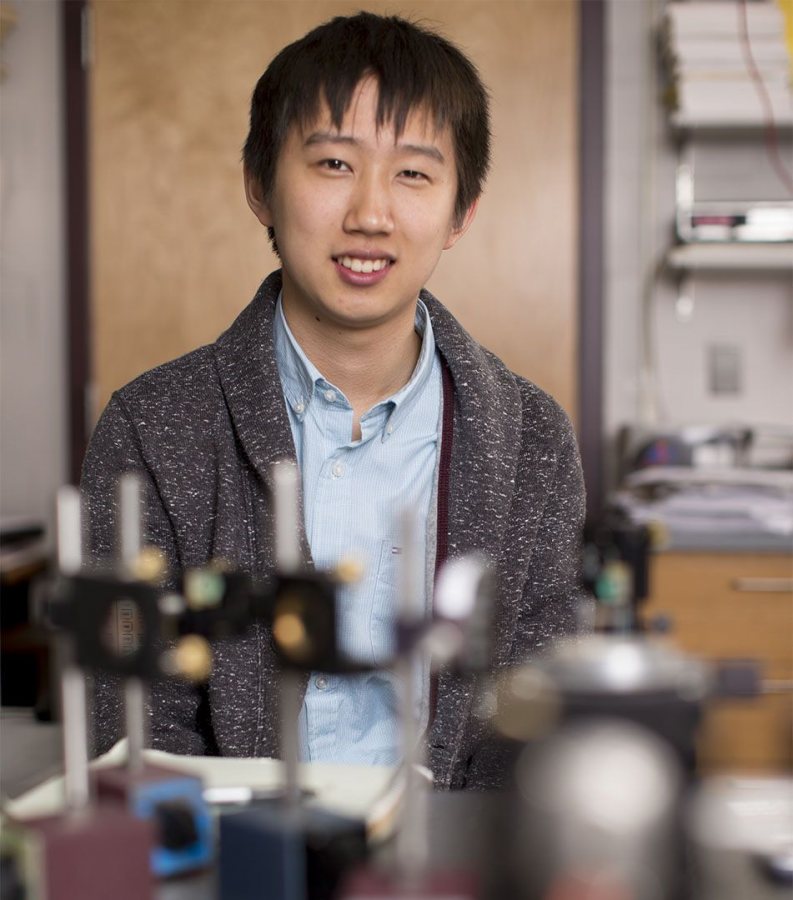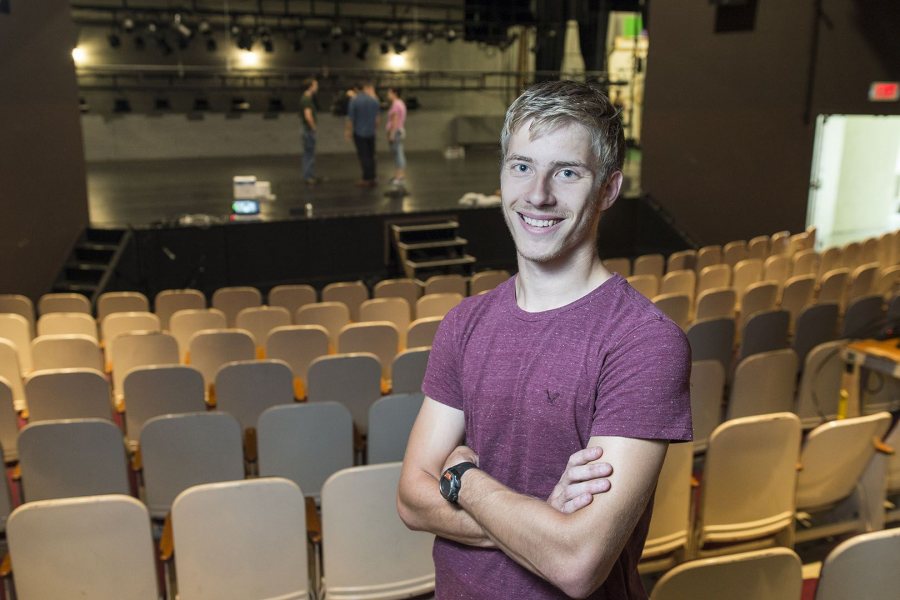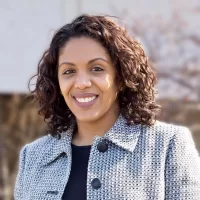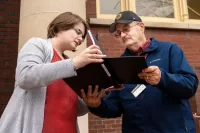
Students explain what their Bates-funded summer work means right now
Here’s what a few of the 238 students who participated in Bates-funded summer internships and other projects say about how those experiences connect to and inspire their work back in the Bates classroom.
+Joe Tulip '18 of Braintree, Mass.
Major: Environmental studies
Project: Purposeful Work intern with Maine Migrant Health Program
Funding: Purposeful Work initiative and Maine Migrant Health Program
Focus: Supporting Maine’s migrant farm worker population through the Maine Migrant Health Program’s mobile clinic
Location: Throughout Maine where migrant workers work, including an apple orchard near campus
Joe: Into the fall, I’ve done community-health work, from checking supplies to educating patients in their native language, Spanish, on their conditions and doing after-visit summaries with patients so they understand how to take prescribed medications, for example.
Migrant workers make up one of the most vulnerable populations in the U.S. The nature of their work means they’re often unable to manage chronic illnesses, save money, or learn English. And due to their travel to Maine, they often do not have enough money to buy food until their first paycheck. It’s fascinating that this is happening in the U.S. and more isn’t being done about it.
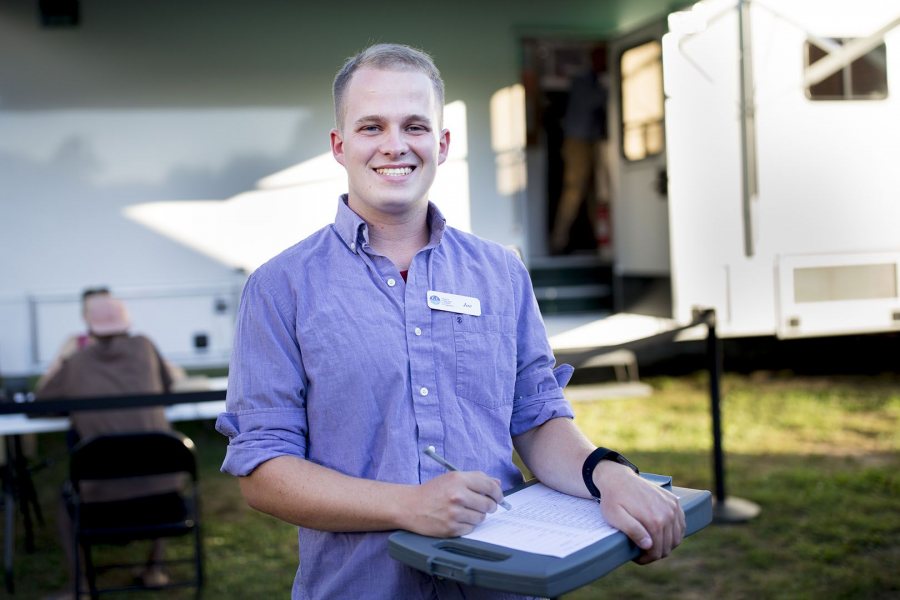
Joe Tulip ’18 outside the Maine Migrant Health Program’s mobile unit at a local apple orchard. (Phyllis Graber Jensen/Bates College)
+Jeremy Glover '17 of Cleveland Heights, Ohio
Major: English
Project: Research assistant with Professor of English Sylvia Federico
Focus: Accompany Federico to the International Congress on Medieval Studies in July as she presented a paper based on her new book, The Classicist Writings of Thomas Walsingham
Funding: Hoffman Research Support Grant
Location: University of Leeds, West Yorkshire, England
Jeremy: My trip made my work over the last few years on medieval English literature and culture come to life. As I embark on writing an honors thesis examining a wide variety of texts from this period, memories of my travels have and will continue to impact how I understand what it means for these texts and their authors to be English.
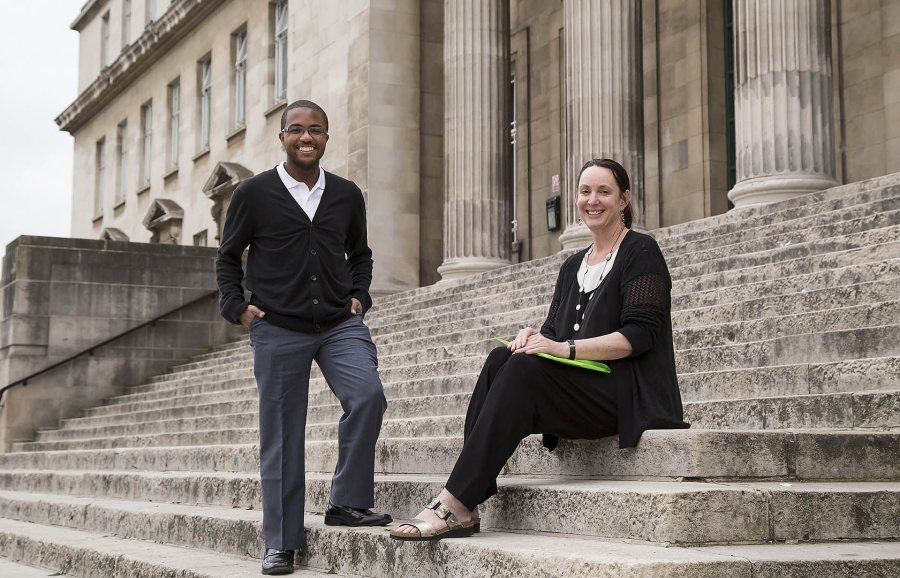
Jeremy Glover ’17 with Professor of English Sylvia Federico at Leeds University. (Claire Wood for Bates College)
+Melody Altschuler '17 of Lyme, Conn.
Major: Psychology
Project: Research assistant with Susan Faja, assistant professor of pediatrics at Harvard Medical School
Focus: In children with autism spectrum disorder, examining neural changes in response to playing computer games designed to improve “executive function” — the brain’s ability to manage complex or conflicting information in the service of attaining a goal.
Funding: Bates Summer Research Fellowship and Hoffman Research Support Grant
Location: Laboratories of Cognitive Neuroscience, Boston Children’s Hospital
Melody: I would love to attend graduate school for clinical psychology, hopefully doing clinical neuroscience research with a focus on autism. Dr. Faja is an amazing mentor and role model for what I aspire to accomplish after graduating from Bates.
As an intern in her lab, I gained hands-on clinical research experience; I also interacted with families, helped out with scheduling testing sessions, and did a lot of “theory of mind” coding, laying the groundwork for updating a coding system that looks at social cognition — how people process social information and solve social problems.
I am excited to continue working with Dr. Faja for my psychology thesis, examining “theory of mind” in children with autism and continuing my research looking at individual differences in children with ASD, particularly in their social cognition.
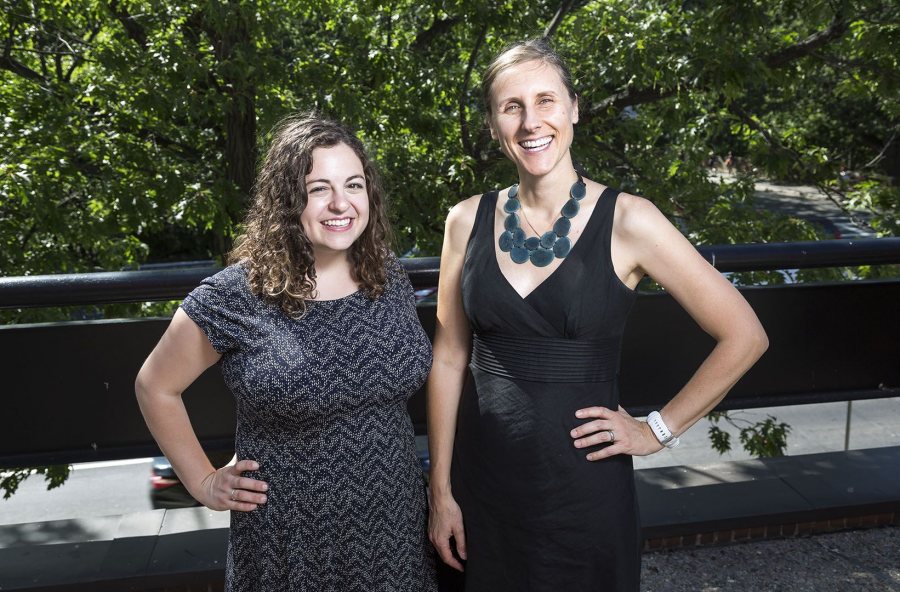
Melody Altschuler ’17 and researcher Susan Faja at Boston Children’s Hospital. (Josh Kuckens/Bates College)
+Jeremy Cairns '19 of Lewiston, Maine
Major: Undeclared
Project: Research assistant with Professor of Chemistry Paula Schlax, helping to identify of pathogens in Maine honeybees
Funding: Sherman Fairchild Faculty-Student Research Grant
Location: Bates
Jeremy: I gained valuable knowledge about real-life lab work, bees, and the pathogens the Varroa mite afflicts the honeybee with. I learned how to extract bee RNA; store it properly to prevent degradation from endogenous RNases; make an elution of the RNA to remove contaminants; and run reverse transcriptase reactions on the RNA to create DNA for testing.
I hope to expand the information I’ve already learned about the bees with what I’ll be learning in “Cell Hell”: cellular and molecular biology. As daunting as Cell Hell has been made out to be, I already recognize the importance it has to me and future.
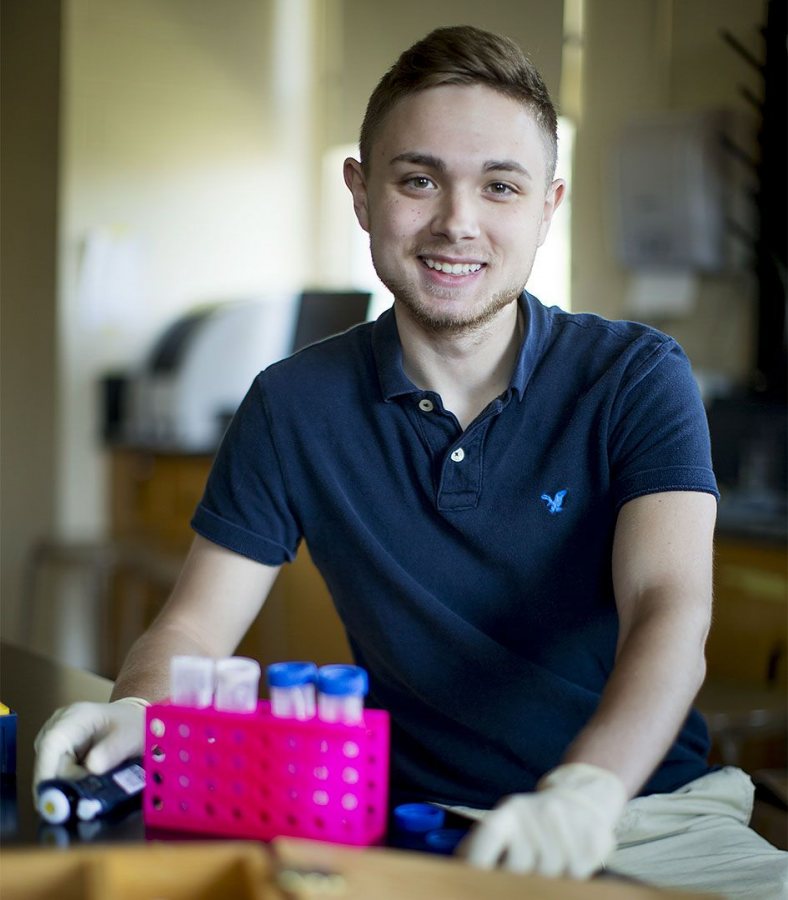
Jeremy Cairns ’18 in the lab of Professor of Chemistry Paula Schlax. (Phyllis Graber Jensen/Bates College)
+Cristopher Thompson '19 of Macon, Ga.
Project: Internship at Auburn/Lewiston Clubhouse of the Boys & Girls Clubs of Southern Maine
Major: Undecided
Funding: Harward Center for Community Partnerships‘ Community Work-Study Fellowship
Focus: Supporting programs for schoolchildren
Location: Auburn, Maine
Cristopher: Where I come from, the struggle is that of disenfranchised people of color. Here, I worked with disenfranchised white people. And there are also poor people of different religions, as well. The linking bond is poverty: Poverty knows no color or religion. That was the big thing for me to know going forward as I go out to accomplish my goals: Don’t count people out.
I learned conflict resolution and communications skills: how to get things across. I learned to embrace the fact that there are things you just can’t wake up and know, like when a kid curses at you or makes racist comments. In that sense, it was a tough ride at first. But you have to be here, going through the work, if you want to help the kids move up and beyond that.
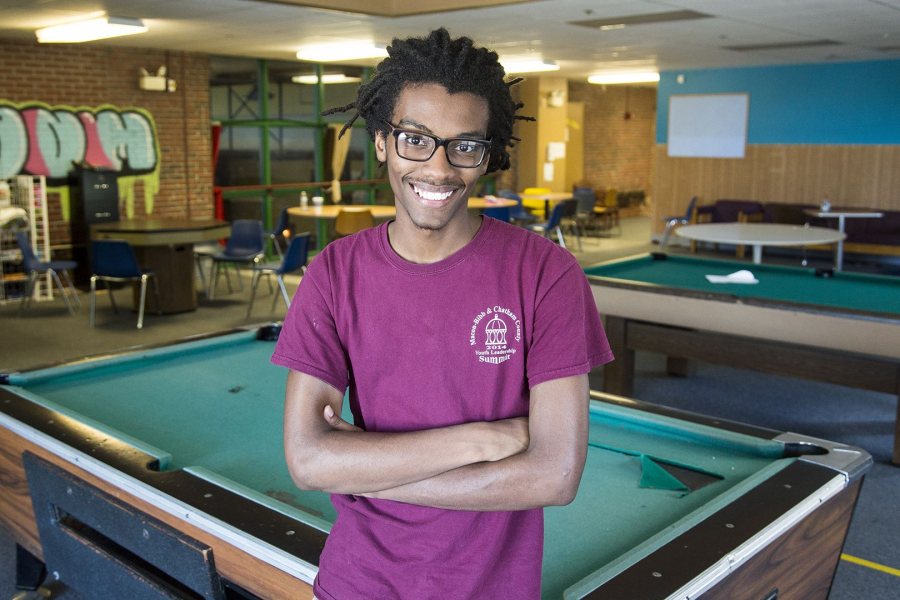
Cristopher Thompson ’19 of Macon, Ga., at the Boys and Girls Club of Auburn, Maine. (Josh Kuckens/Bates College)
+Colby Harrison '17 of Kennebunk, Maine, and Katie Van Patten '17 of Chico, Calif.
Major: Neuroscience and theater (Harrison); theater and Japanese (Van Patten)
Project: Internship in directing at Opera House Arts of Stonington, Maine
Focus: Close observation of directors, dramaturgical research, running lights and sound, volunteering at Opera House events
Funding: Opera House Arts at the Stonington Opera House
Location: Theater venues in and around Stonington, Maine
Katie: In general, there are not a lot of directing-specific internship opportunities at the undergrad level, so this was really fantastic. I learned a lot of things that I’ll hopefully be able to apply to my directing thesis this semester. Working in a professional setting in general is super-valuable as I think about graduation and how I would like to be working once I graduate.
Colby: This internship, within the Bates academic track, reminds me exactly how much I’ve learned through the theater department. All of the professionals here use many of the same techniques as the students use on campus.
As for my career, this internship has helped me see the balance between doing the show you might love versus doing the show that will sell. Theaters like the Opera House must walk that fine line in order to keep audiences and make money.
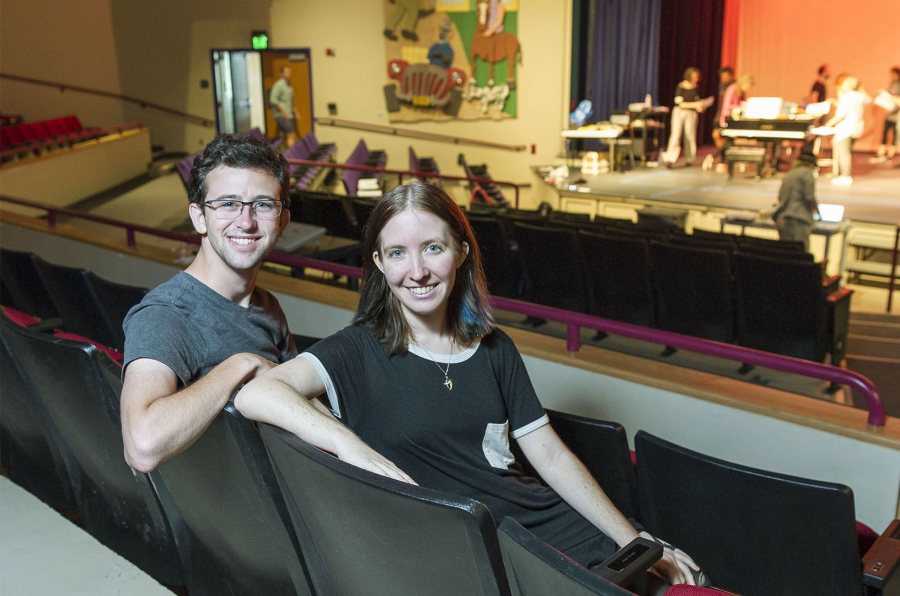
Colby Harrison ’17 and Katie Van Patten ’17 at the Reach Performing Arts Center in Deer Isle, Maine (Josh Kuckens/Bates College)
+Michael Varner '17 of Chelsea, Mich., and Fan Dong '17 of Beijing
Major: Politics and economics (Dong); economics (Varner)
Project: Purposeful Work interns with Associate Professor of Economics Nathan Tefft
Funding: Looking Glass Investments
Focus: Supporting predictive analytics of Looking Glass Investments, an investment firm focused on marketplace lending, of which Tefft is chief economist and executive vice president
Location: Looking Glass Investments offices in Brunswick, Maine
Fan: I had access to almost all areas of the business. It’s a small company, yet such an integrated team doing real work to help improve the models and help LGI increase return every day and strengthening econometric and coding skills all the time. My team was in charge of running data analysis and developing predictive models, so I gained a lot of hands-on experiences testing new machine learning methods and coding in different languages.
Michael: The work was directly related to the class “Big Data and Economics” that Fan and I both took last semester with [Tefft]. We used a lot of similar methods in class that we do here. It’s interesting: We’ve transitioned from an academic setting to a corporate setting — a business.
I worked to learn the investing algorithms that my company uses and taught myself the coding necessary to use and modify the software. Independent learning is a useful skill that will help me not only in my current internship but also in future endeavors.
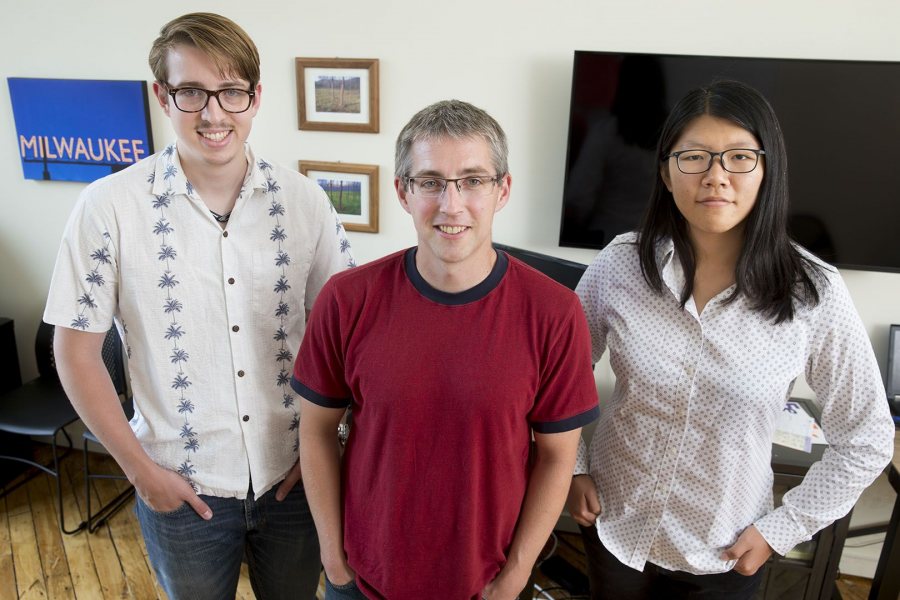
Michael Varner ’17, Associate Professor of Economics Nathan Tefft, and Fan Dong ’17 in the offices of Looking Glass Investments in Brunswick, Maine. (Phyllis Graber Jensen/Bates College)
+Annakay Wright '17 of Brooklyn, N.Y.
Major: Women and gender studies
Project: Research assistant with Associate Professor of Women’s Studies and of English Language and Literature Victor Mendoza, University of Michigan
Funding: C3 Fellowship
Focus: North Carolina’s bathroom laws
Location: University of Michigan
Annakay: My summer research provided me with the skills and knowledge I can apply to my future goals. I did preliminary research for my thesis and gained a new understanding of queer politics, which makes me so excited to do my thesis at Bates surrounded by professors who I’ve developed strong relationships with.
I started applying for grad schools over the summer, and it’s so amazing the amount of advice and support I’ve gotten from my Bates professors and staff about the process.
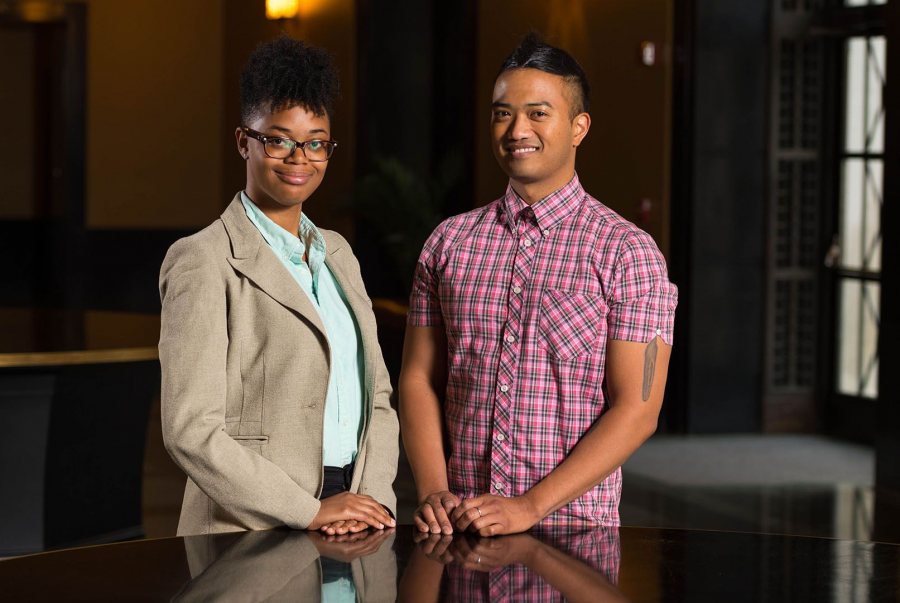
Annakay Wright ’17 poses with Professor of Women’s Studies and English Victor Mendoza at the University of Michigan. (Daryl Marshke for Bates College)
+Emma Katz ‘17 of Holmdel, N.J.
Major: Environmental studies
Project: Research assistant with Assistant Professor of Biology Carla Essenberg
Funding: Bates Summer Research Fellowship
Focus: Plant relationships with their pollinators, specifically bumblebees.
Location: Bates
Emma: First, I was able to design and conduct my own study, and will use the data I collected from this study for my senior thesis In addition, I gained valuable lab skills that I will use at Bates and in my future career in research. Lastly, working with insects — bumblebees — was not something I had ever thought about doing, and I am glad I worked out of my comfort zone this summer so that I am more willing to do so in the future.
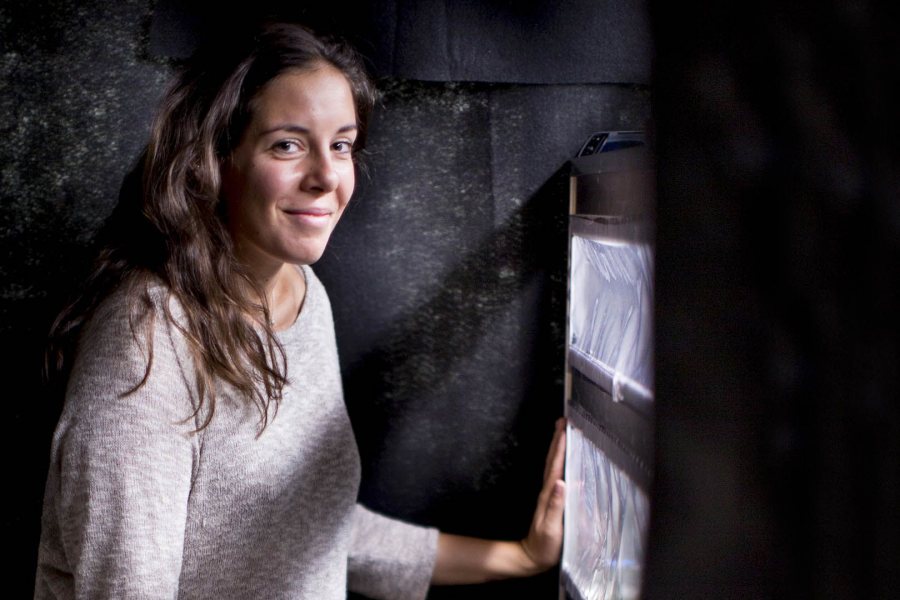
Emma Katz ‘17 poses in the lab of Assistant Professor of Biology Carla Essenberg. (Phyllis Graber Jensen/Bates College)
+Summer Peterson '18 of Yorba Linda, Calif.
Major: Psychology, Japanese
Project: Purposeful Work intern with doctoral students Kathryn Fox and Steven Felix at Harvard University
Funding: Purposeful Work initiative
Focus: Self-injurious behaviors (with Fox) and how “perceived criticism” develops in romantic relationships (with Felix)
Location: Harvard University
Summer: After this summer, I don’t want to stop looking for answers through research. You don’t always get the results you want (or any result at all), and it basically never goes according to plan, but it is captivating and exhilarating.
I quickly learned how to work with research participants and supervisors and how to be more “grown-up” than my 20 years have taught me to be! The sensitive nature of the topics I am studying (self-injurious behaviors and perceived criticism) means that what I hear can be upsetting. But I have to act maturely and professionally despite how much I, at times, just wanted to hug the participant.
I also improved my communication skills because I was, essentially, on the first line for questions and concerns about the research we were working on. If I couldn’t help, then they would go to my boss. I learned to reiterate, speak clearly, ask my own questions early on, and, when finished, ask the person if I made sense or if they have questions.
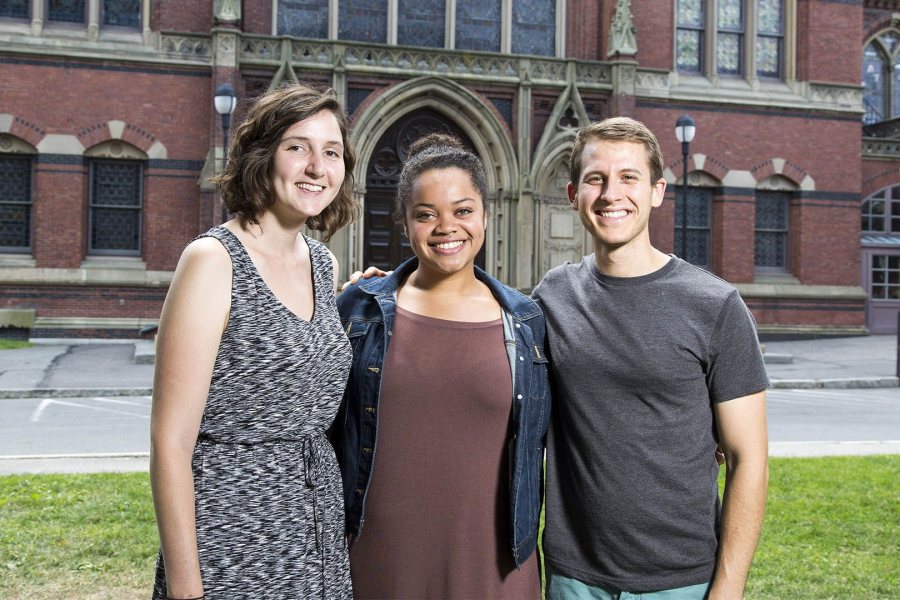
Kathryn Fox, Summer Peterson ’18, and Steven Felix at Harvard University. (Josh Kuckens/Bates College)
+Olin Carty '17 of Des Moines, Iowa, and Madeline Bruno '17 of Denver, Colo.
Major: Mathematics and geology (Carty); geology (Bruno)
Project: Research assistant with Assistant Professor of Geology Geneviève Robert
Funding: Bates Summer Research Fellowship and Hoffman Research Support Grant (Bruno), and Sherman Fairchild Faculty-Student Research Grant (Carty)
Focus: How the presence of the element fluorine affects the viscosity of magma
Location: Bates
Madeline: In the lab we spent a lot of time planning and making many glass samples of many different compositions, which is very hands-on and can be fast-paced. In my academic work, I’m looking forward to slowing down, taking a step back, and gaining a thorough understanding of the bigger picture of this project.
It’s relatively easy to look at the data from the samples I have individually run and understand what the numbers are telling me. It’s harder to understand the implications of this data on my individual thesis, on the theses from other students and papers I am building on, and on work going on in the broader scientific community.
Olin: Not only did being at Bates this past summer allow me to get a good head start on my work for this year and give me time to become immersed in the research I was doing, but it allowed me to share my experiences with other students who spent the summer at Bates and to learn what other students were doing as well.
For me, one of the most exciting parts of my summer was when I was able to give a short tour of my lab. This allowed me to share the research I was doing with other students and faculty interested in the sciences, and allowed me to explain the instruments I was using to them.
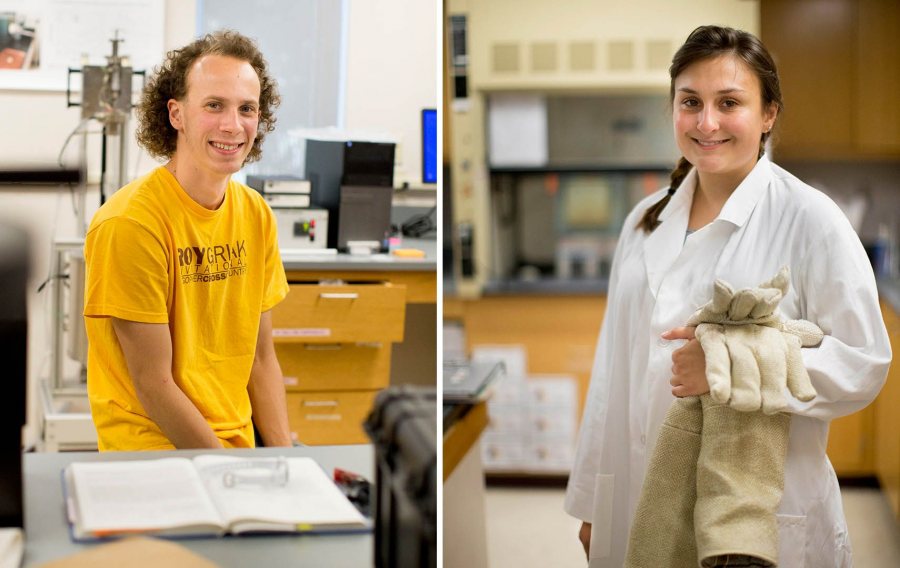
Olin Carty ’17 and Madeline Bruno ’17 in the lab of Assistant Professor of Geology Geneviève Robert. (Phyllis Graber Jensen/Bates College)
+Salim Ourari '18 of Ariana, Tunisia, and Ian Wax '19 of Briarcliff Manor, N.Y.
Major: Physics (Ourari); undeclared (Wax)
Project: Research assistants with Lecturer in Geology and Physics Raj Saha ’03
Funding: Sherman Fairchild Faculty-Student Research Grant (Ourari) and Bates Faculty Development Grant (Wax)
Focus: Researching techniques to measure sea ice thickness (Ourari) and the Indian monsoon (Wax)
Location: Bates plus local fieldwork
Salim: Starting a complex project like the development of an aerial instrument to measure sea-ice thickness made me realize the importance of group work. As a physics student working alone on this project, I realized how helpful this could be to have partners with expertise in other fields.
Ian: The research I was involved with focused on better understanding patterns of the Indian monsoon. Working with Raj, I learned how much of an impact the Indian monsoon has on the Indian people and how climate change is altering the monsoon’s behavior. Raj and I also sent up a high-altitude weather balloon. I am excited to continue to work with Raj on more launches and other research projects!
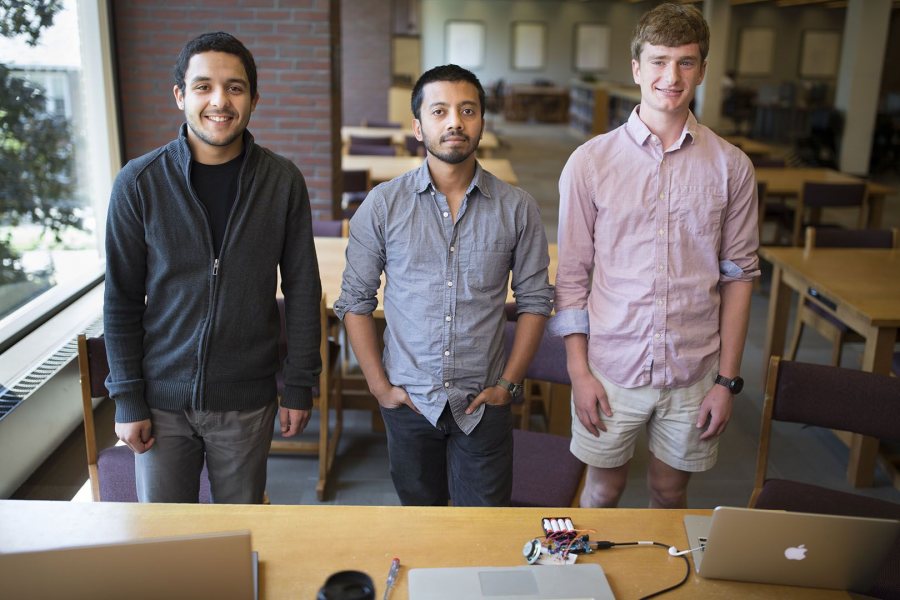
Salim Ourari ’18, Lecturer in Geology Raj Saha ’03, and Ian Wax ’19 in Ladd Library. (Phyllis Graber Jensen/Bates College)
+Mike Mulach '17 of Rocky River, Ohio
Major: Economics, art and visual culture
Project: Purposeful Work intern at TM Capital with Brad Adams ’92
Funding: Purposeful Work initiative and TM Capital
Focus: The ins and outs of an investment-banking analyst’s job
Location: Boston, Mass.
Mike: At TM, I did everything a full-time person would do. My work as an intern went into the final product seen by a client, which is actually really cool. For a kid in the liberal arts not knowing a lot about investment banking, I really couldn’t have asked for a better spot — just a perfect environment to ask questions and to learn from your mistakes and your experiences.
A lot of kids come into school their freshman year and say, “I want to do finance” and they think finance is only a banking thing. Thanks to alumni like Brad, you really get to understand the whole scope of finance. There’s just so many different jobs you can do. Also, I got to know the Bates network in Boston, which is nice.
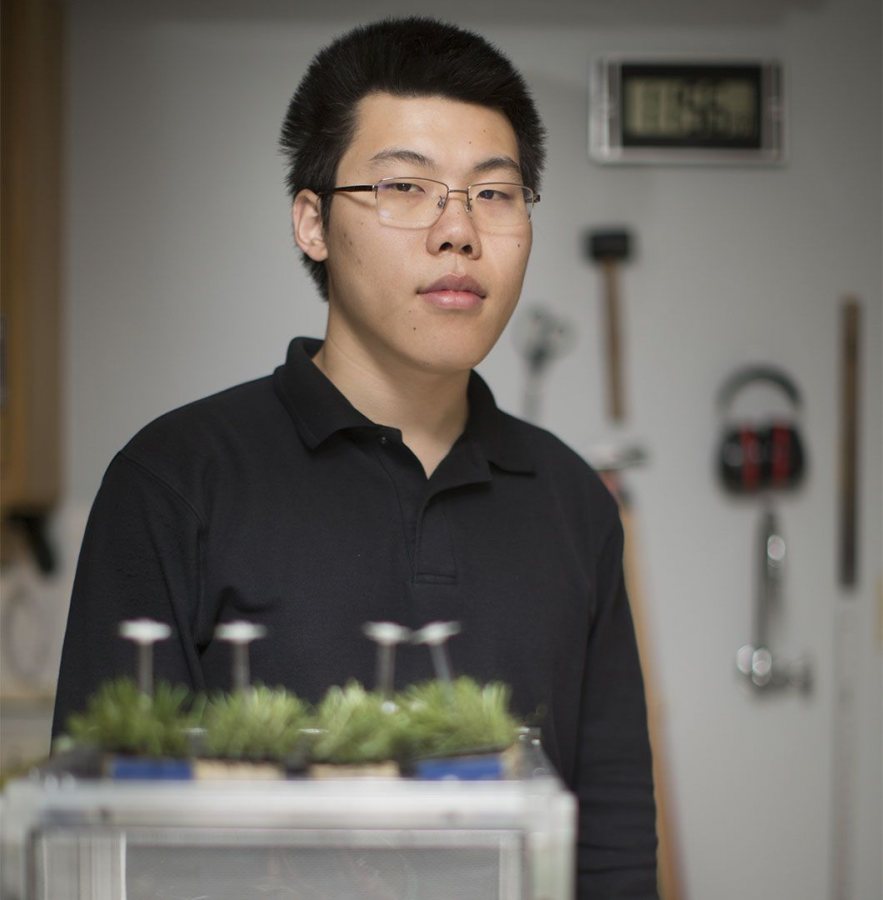
Xioameng Wang ’19 poses in the lab of Assistant Professor of Biology Carla Essenberg. (Phyllis Graber Jensen/Bates College)
+Will Hilton '17 of Coral Gables, Fla.
Major: Environmental studies
Project: Research assistant with Professor of Environmental Studies Holly Ewing and Professor of Geology Mike Retelle
Funding: Dorothy Dole Johnson ’41 Endowment
Focus: Studying past sediment inputs to Lake Auburn
Location: Auburn, Maine
Will: I enjoyed the time I spent on campus over the summer. Being able to work in the lab on my own and formulate my own questions is something that I’ve had relatively little experience doing. I feel that the thesis process is great preparation for what lies ahead in the world.
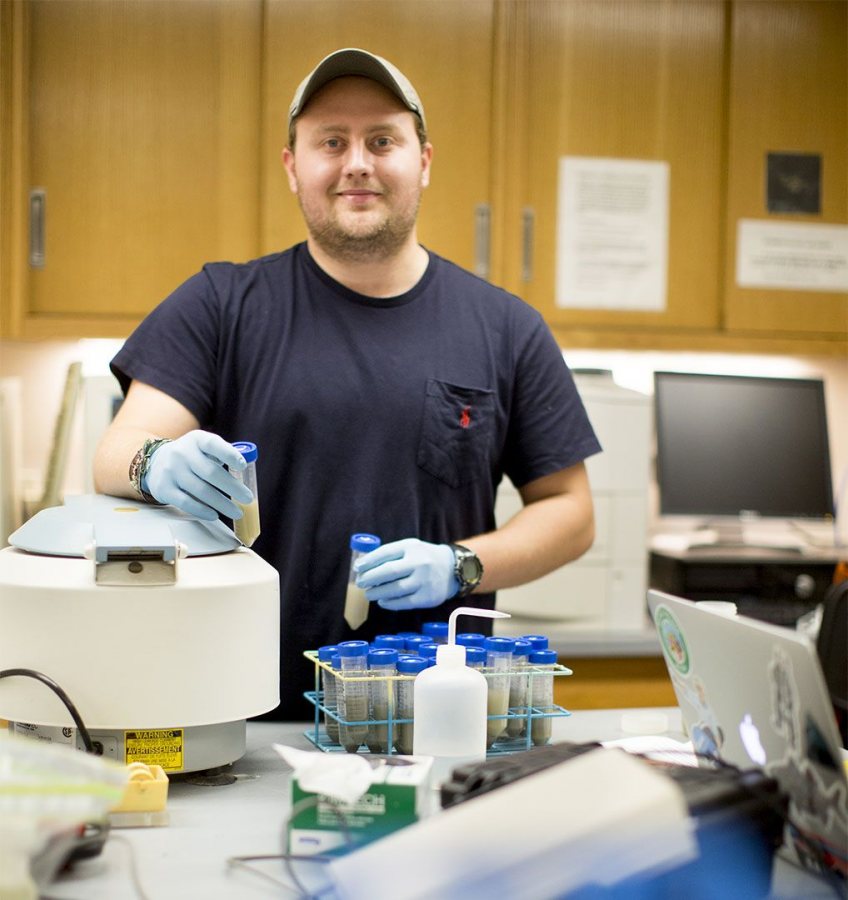
Will Hilton ’17 in the lab of Professor of Geology Mike Retelle. (Phyllis Graber Jensen/Bates College)
+Max Huang '18 of Suzhou, China
Major: Physics, mathematics, economics
Project: Research assistant with Professor of Physics Hong Lin
Funding: STEM Endowment Faculty-Student Research Grant
Focus: Instabilities in vertical-cavity surface-emitting lasers subject to optical injection
Location: Bates
Max: This summer research not only taught me how to generate microwave signals by using a vertical-cavity surface-emitting laser but also enlightened me how to be a problem-solver in the lab and an independent thinker standing in the shoes of a professional physicist.
Prior to this research, my study in physics was plain and, let’s say, somehow unmotivated. Admittedly, the coursework was vital for the understanding of the research, but sometimes it was too theoretical. I couldn’t see any straightforward applications.
But the lab experience showed me the insights of potential applications, helped me connect the theoretical work to real experimental work, and, most importantly, gave me a reason to stay motivated in exploring physics.
+Jason Ross '19 of Des Moines, Iowa
Major: Undeclared
Project: Purposeful Work intern with the Bates Dance Festival
Funding: Purposeful Work initiative
Focus: Technical theater
Location: Bates
Jason: I didn’t know if I wanted to to do an internship in technical theater because I was already more focused on chemistry. But I thought, “It’s early on, so I might as well figure out if this is something that I want to do with my life instead of being a chemistry major.”
I found myself fully immersed in the creative problem-solving attitude of theater. Whether this is a blessing or curse is something I’m still trying to figure out!
There have been intense moments at crunch times but there’s also the idea of learning on the job and understanding why things work and how things work. [The technical directors] bring a whole new level to the way things get done that I would have never seen before.
We work 14-hour days together. I’ve never worked with such close family. Sure we give each other crap and there’s hard days, but when we work together and we’re all on the same mindset it’s like magic backstage, it’s really cool.
